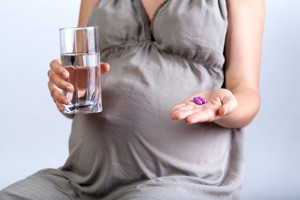 You can give your baby the best start in life before he or she is even conceived by taking vitamins and supplements. With supermarket and pharmacy shelves brimming with an array of different supplements, it can be confusing to know which ones you need. Some vitamins and minerals are more important than others during pregnancy, whilst others should be avoided all together. We outline them here.
You can give your baby the best start in life before he or she is even conceived by taking vitamins and supplements. With supermarket and pharmacy shelves brimming with an array of different supplements, it can be confusing to know which ones you need. Some vitamins and minerals are more important than others during pregnancy, whilst others should be avoided all together. We outline them here.
Essential Vitamins
In the UK, the NHS recommends that all pregnant women take supplements for both Folic Acid and Vitamin D.
Folic Acid
You should take a folic acid supplement as soon as you decide to start trying to conceive up until you are 12 weeks pregnant. You need to take 400 micrograms per day, which is double the dose found in most standard multi-vitamin supplements. This is because folic acid significantly reduces the chances of your baby being born with spina bifida and other complications associated with defects in the brain, spine, and spinal cord.
You can get folic acid from certain foods, but it is difficult to get the amount that you need in pregnancy from diet alone, which is why a supplement is recommended. Foods that are high in folic acid include leafy vegetables such as spinach and brown rice. If you have already conceived but have not started to take folic acid then don’t panic and try and start a daily supplement as soon as possible.
The risk of having spina bifida is very low – around one in 5,000 children born in the UK have the condition. However, there are some factors that will increase the risk of you having a child with spina bifida. If you have diabetes, or a family history of defects in the brain, spine, and spinal cord such as spina bifida, then you are advised to increase the amount of folic acid you take to 500 micrograms per day.
Vitamin D
Vitamin D is an essential vitamin for the growth of healthy bones. It enables our bodies to successfully absorb calcium, which is needed for strong bones and teeth. During pregnancy and breastfeeding, it’s important to take 10 micrograms of Vitamin D each day to ensure that your baby gets the required amount to develop strong bones. Not enough vitamin D can lead to rickets, which is where the child’s bones become soft and often deformed.
During the summer, you can get Vitamin D from just 15-minutes exposure to sunlight between the hours of 11am and 3pm. However, in the UK during the winter months the sun’s rays are not powerful enough to enable our bodies to generate vitamin D, which is why supplements are recommended.
Beneficial Vitamins
Other vitamins and minerals may have a beneficial effect on your pregnancy, although, with the exception of where the mother may be deficient, it is not considered essential to take supplements for them, as most people will get them from diet alone.
Iron
Iron is essential for healthy blood, as it is used to create red blood cells that carry oxygen around our bodies. You can get lots of iron from foods such as red meat and green leafy vegetables, as well as many breakfast cereals where they have been fortified with iron. However, some women do not have enough iron and this can cause anaemia which leads to tiredness, dizziness, and headaches.
During your booking appointment with your midwife you will be offered a blood test to check your iron levels. If this test shows that your iron is low then you will be advised to take additional iron supplements.
Vitamin C
Vitamin C is associated with a healthy immune system, as it helps our cells to repair themselves when faced with illness or injury. Keeping healthy throughout your pregnancy will make the process easier for you. The vitamin will also help your baby’s body develop the proteins needed to create skin and bones. Vitamin C is available in abundance in citrus fruits and many green vegetables, although cooking the vegetables can destroy the Vitamin C.
Vitamin B2, B6, B12
B vitamins are essential for enabling our bodies to get energy from the foods we eat, as well as create red blood cells, and in the case of B12, process folic acid which can prevent defects occurring in the spine, brain, and spinal cord. Most people will get enough B vitamins from diet alone, as they are present in meat and dairy products. However, if you are following a vegan diet then you may have low levels of these vitamins and require a supplement.
What Vitamins Should Be Avoided During Pregnancy?
Vitamin A supplements should be avoided in pregnancy if they are derived from Retinol, which is produced from animals. This is because this source of Vitamin A can be harmful to your baby whilst in the womb. This is why it is also recommended that pregnant women also avoid eating liver, as it is high in Retinol. Vitamin A that is derived from plant sources (beta-carotene) is fine, but if you have a multi-vitamin supplement with Vitamin A and you are not sure where it is sourced from then it is best to avoid taking it.
Do I Need To Buy Specific Pregnancy Supplements?
 As only folic acid and vitamin d supplements are considered essential for pregnant women, you can choose to only take a supplement containing these two vitamins. Look for a pregnancy supplement with folic acid and vitamin d, which will have the correct doses required for pregnant women.
As only folic acid and vitamin d supplements are considered essential for pregnant women, you can choose to only take a supplement containing these two vitamins. Look for a pregnancy supplement with folic acid and vitamin d, which will have the correct doses required for pregnant women.
Alternatively, you may wish to take a multivitamin supplement that includes other vitamins and minerals. In this case, it is best to choose one that is aimed specifically at pregnant women as it will contain the correct dose of folic acid and vitamin D, and will not contain the animal form of vitamin A.
